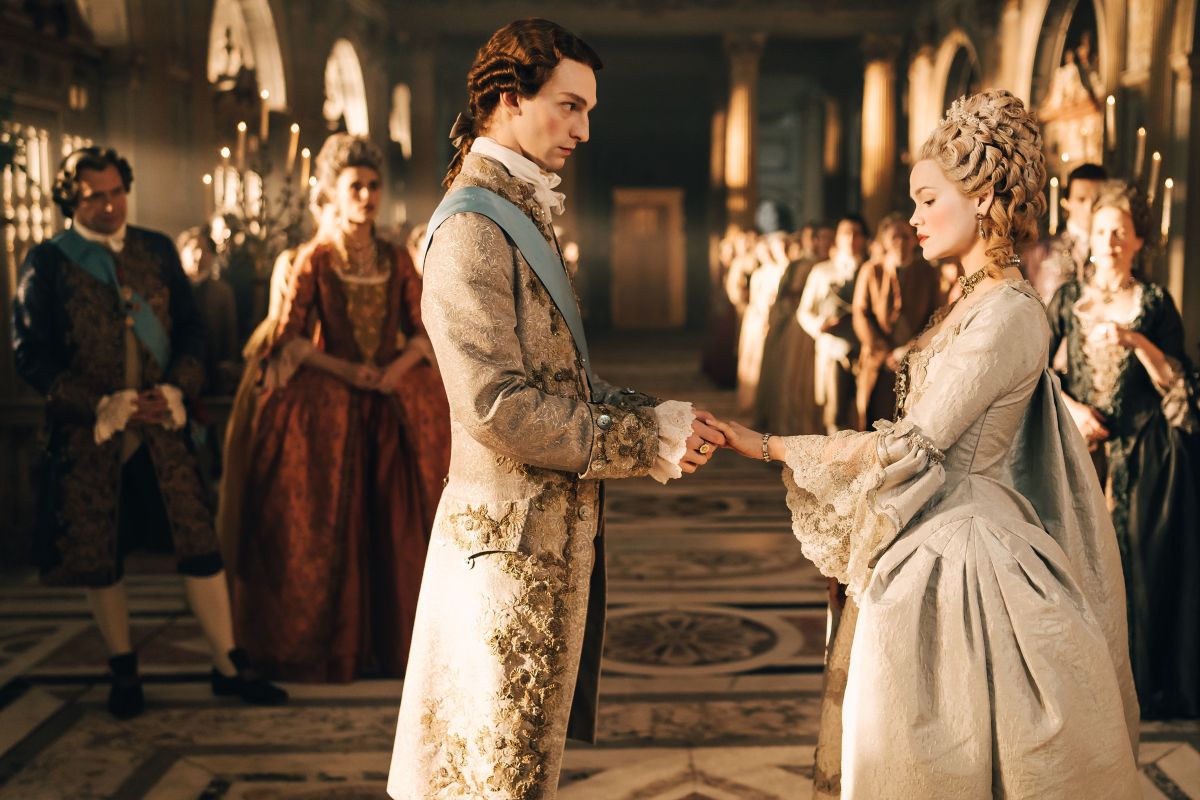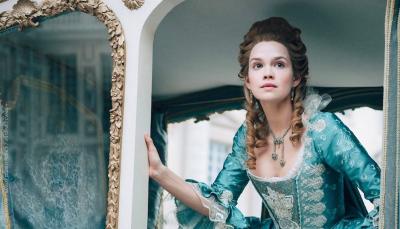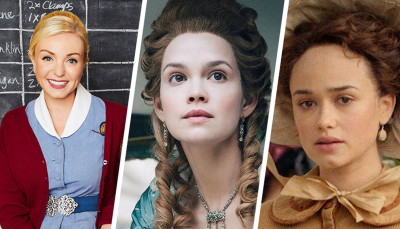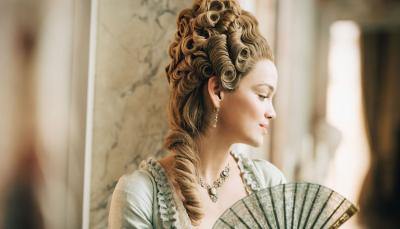Emilia Schüle & Louis Cunningham Discuss the History Behind 'Marie Antoinette'
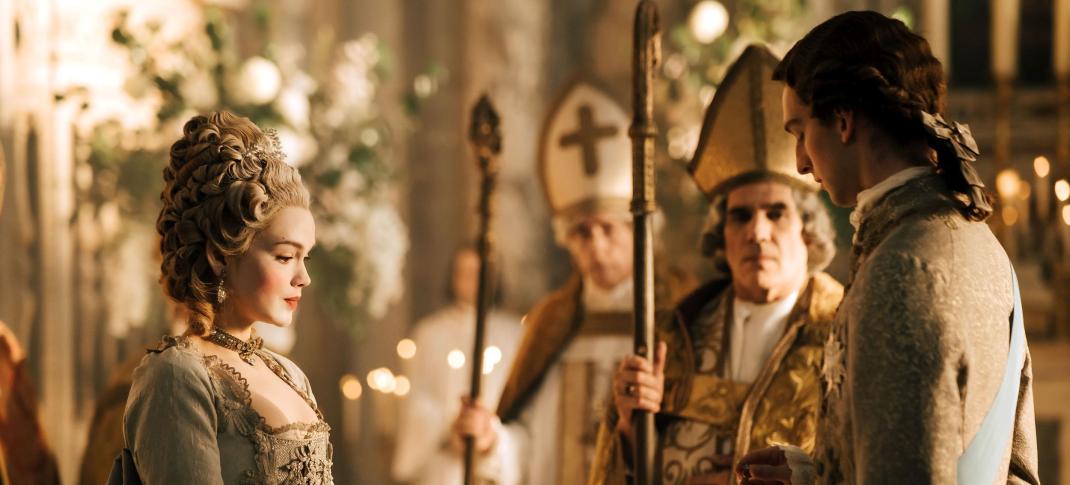
Emilia Schüle as Marie Antoinette and Louis Cunningham as Louis XVI in 'Marie Antoinette' Episode 1
©Caroline Dubois/Capa Drama/Banijay Studios France/Les Gens/Canal+
As a historical figure, Marie Antoinette is often held up as the epitome of wealth and privilege in a time when monarchies were rapidly losing their hold on power. Most school children learn of her as the uncaring ruler who seemed confused at the peasants having no bread, declaring, "Let them eat cake!" before being beheaded forthwith. Previous attempts at reconsidering her on film have not gone well either; Sofia Coppola's 2006 production, starring Kirsten Dunst, failed badly with critics. But the newest retelling of her life story, Marie Antoinette, a FrancoBritish show from Canal+ and the BBC, may finally set the record straight.
It helps that the titular character, who started life as an Archduchess of Austria, is played by German actor Emilia Schüle, whose career in her native country began at 14 — the same age as Marie Antoinette was when she was sent across the border to marry the French Dauphin and heir to the throne, Louis-Auguste. Her fiance is played by British actor Louis Cunningham, who has the tough job of playing an anxiously shy second son who accidentally wound up the heir, surrounded by a family he cannot trust, and a marriage both are forced into, despite its disastrous unpopularity.
When asked about trying to break away from previous portrayals of Marie Antoinette, Schüle is passionate in defense of her character. "Marie Antoinette is a misunderstood person," she declares.
"People nowadays see her by what's been framed by the revolution, by all those rumors that were supposed to destroy her and harm her," Schüle explains. "She is much more complex than that and much more modern. She was fighting to preserve her freedom, her privacy. She never abandoned her personal needs. She always stood up for herself; she embodies our views today of equality, individuality, and self-determination; these modern qualities eventually enabled her enemies to destroy her and undermine her."
For Cunningham, the role was a challenge, as his character barely speaks in the first few episodes and certainly never to Marie, whose self-assured persona intimidates him. "When you're saying the lines, you can hear it, you can tell if it was bad, you can redo it," he says. "But with this, I couldn't often go and check the monitor to see if what I'd done was reading; small little eye movements or glances here and there, a lot of tense body."
Cunningham admits he didn't plan it that way, but the tenseness in his body just happened. "It seemed to just come with it, not being able to produce words, and the frustration, the anger, the kind of guilt that comes with that, too. And I think those emotions lock you up."
The series begins with Marie and Louis as young teens when they're forced to get married and traces how they slowly form a relationship despite the pressures the outside world puts on them to breed. "I thought it's just beautiful," Schüle says of their love story. "These two young kids have so much pressure on their shoulders."
"I hope [audiences] appreciate this weird, unconventional, beautiful love story," Cunningham agrees, especially in the (historically accurate) issues the two had in figuring out how to have sex. "That was interesting to approach because we both discussed what we thought the reasons were for why they weren't doing it, and that reflected how we approached the actual sex scenes themselves. We would read different accounts of why and all the speculation and send each other [articles], 'Have you read about this theory?'"
"Her job is to produce this baby, produces heirs," Schüle says. "And he doesn't talk to her, doesn't touch her for seven years, and the whole world is watching, and that's humiliating, traumatizing." And she has no support, and Schüle took that as a place where the need to indulge herself stemmed. "That's my theory anyway," she says. "She's in this family where she's not welcomed; all these circumstances are hard to bear. She developed this lust for life, beautiful things, and partying because she wanted to distract herself from her feelings; it's the easiest way as she was still a teenager."
"It takes them six hours of the show to do it," Schüle laughs. (Spoiler alert!) "I enjoyed playing that much more than everything else."
Considering how frank the show is about sex and the marketing of Marie Antoinette showing the character kissing women, some might argue the series isn't historically accurate. Cunningham scoffs. "People can talk about historical accuracy, but what's interesting is how we view history through today's lens."
"We have this one image of her that she's spoiled, and she's big wigs and partying," Schüle adds. "And I want to take the people to take away from the show is that she was a tragic figure; she was struggling to find her place and living in a very hostile environment where people just wanted to get rid of her. They hated her because she was Austrian."
"She was a rebel, she was a queen, she was a mother, she was an icon, and she was a human being. She was fighting to be human to preserve, you know, some privacy to, like, escape those stupid rules at court and everything. I think that sums up what her struggle was. It's just so much more complex than what people think."
Marie Antoinette premieres on Sunday, March 19, 2023 on most PBS stations at 10 p.m. ET. As always, check your local listings.


